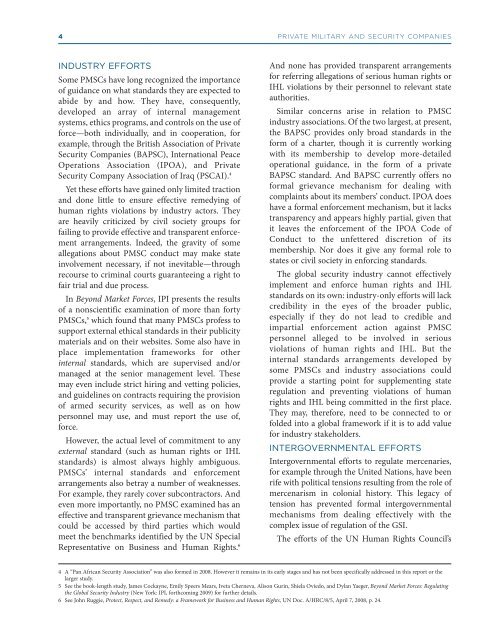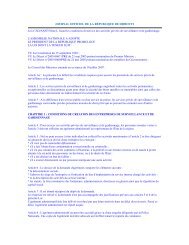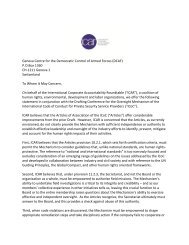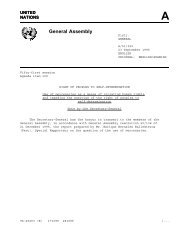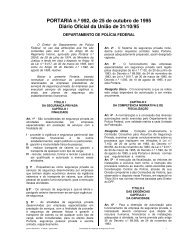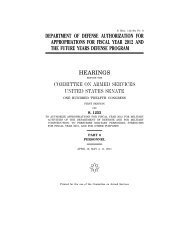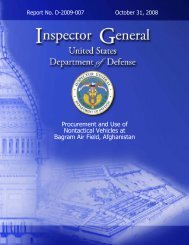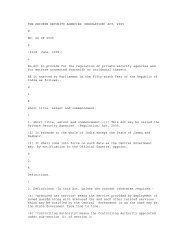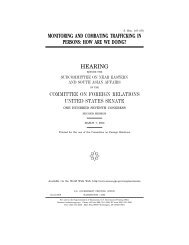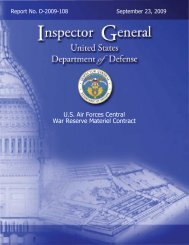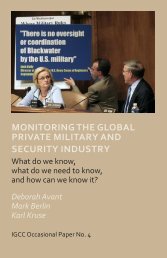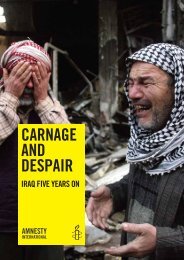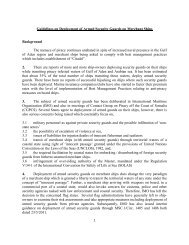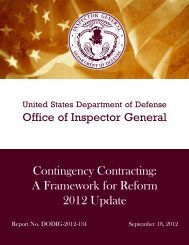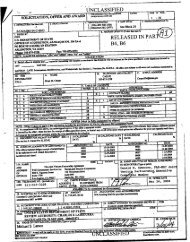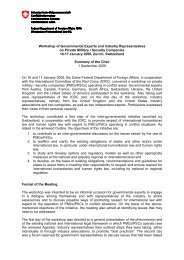A Framework for Regulation - Private Security Monitor
A Framework for Regulation - Private Security Monitor
A Framework for Regulation - Private Security Monitor
- No tags were found...
You also want an ePaper? Increase the reach of your titles
YUMPU automatically turns print PDFs into web optimized ePapers that Google loves.
4 PRIVATE MILITARY AND SECURITY COMPANIESINDUSTRY EFFORTSSome PMSCs have long recognized the importanceof guidance on what standards they are expected toabide by and how. They have, consequently,developed an array of internal managementsystems, ethics programs, and controls on the use of<strong>for</strong>ce—both individually, and in cooperation, <strong>for</strong>example, through the British Association of <strong>Private</strong><strong>Security</strong> Companies (BAPSC), International PeaceOperations Association (IPOA), and <strong>Private</strong><strong>Security</strong> Company Association of Iraq (PSCAI). 4Yet these ef<strong>for</strong>ts have gained only limited tractionand done little to ensure effective remedying ofhuman rights violations by industry actors. Theyare heavily criticized by civil society groups <strong>for</strong>failing to provide effective and transparent en<strong>for</strong>cementarrangements. Indeed, the gravity of someallegations about PMSC conduct may make stateinvolvement necessary, if not inevitable—throughrecourse to criminal courts guaranteeing a right tofair trial and due process.In Beyond Market Forces, IPI presents the resultsof a nonscientific examination of more than <strong>for</strong>tyPMSCs, 5 which found that many PMSCs profess tosupport external ethical standards in their publicitymaterials and on their websites. Some also have inplace implementation frameworks <strong>for</strong> otherinternal standards, which are supervised and/ormanaged at the senior management level. Thesemay even include strict hiring and vetting policies,and guidelines on contracts requiring the provisionof armed security services, as well as on howpersonnel may use, and must report the use of,<strong>for</strong>ce.However, the actual level of commitment to anyexternal standard (such as human rights or IHLstandards) is almost always highly ambiguous.PMSCs’ internal standards and en<strong>for</strong>cementarrangements also betray a number of weaknesses.For example, they rarely cover subcontractors. Andeven more importantly, no PMSC examined has aneffective and transparent grievance mechanism thatcould be accessed by third parties which wouldmeet the benchmarks identified by the UN SpecialRepresentative on Business and Human Rights. 6And none has provided transparent arrangements<strong>for</strong> referring allegations of serious human rights orIHL violations by their personnel to relevant stateauthorities.Similar concerns arise in relation to PMSCindustry associations. Of the two largest, at present,the BAPSC provides only broad standards in the<strong>for</strong>m of a charter, though it is currently workingwith its membership to develop more-detailedoperational guidance, in the <strong>for</strong>m of a privateBAPSC standard. And BAPSC currently offers no<strong>for</strong>mal grievance mechanism <strong>for</strong> dealing withcomplaints about its members’ conduct. IPOA doeshave a <strong>for</strong>mal en<strong>for</strong>cement mechanism, but it lackstransparency and appears highly partial, given thatit leaves the en<strong>for</strong>cement of the IPOA Code ofConduct to the unfettered discretion of itsmembership. Nor does it give any <strong>for</strong>mal role tostates or civil society in en<strong>for</strong>cing standards.The global security industry cannot effectivelyimplement and en<strong>for</strong>ce human rights and IHLstandards on its own: industry-only ef<strong>for</strong>ts will lackcredibility in the eyes of the broader public,especially if they do not lead to credible andimpartial en<strong>for</strong>cement action against PMSCpersonnel alleged to be involved in seriousviolations of human rights and IHL. But theinternal standards arrangements developed bysome PMSCs and industry associations couldprovide a starting point <strong>for</strong> supplementing stateregulation and preventing violations of humanrights and IHL being committed in the first place.They may, there<strong>for</strong>e, need to be connected to orfolded into a global framework if it is to add value<strong>for</strong> industry stakeholders.INTERGOVERNMENTAL EFFORTSIntergovernmental ef<strong>for</strong>ts to regulate mercenaries,<strong>for</strong> example through the United Nations, have beenrife with political tensions resulting from the role ofmercenarism in colonial history. This legacy oftension has prevented <strong>for</strong>mal intergovernmentalmechanisms from dealing effectively with thecomplex issue of regulation of the GSI.The ef<strong>for</strong>ts of the UN Human Rights Council’s4 A “Pan African <strong>Security</strong> Association” was also <strong>for</strong>med in 2008. However it remains in its early stages and has not been specifically addressed in this report or thelarger study.5 See the book-length study, James Cockayne, Emily Speers Mears, Iveta Cherneva, Alison Gurin, Shiela Oviedo, and Dylan Yaeger, Beyond Market Forces: Regulatingthe Global <strong>Security</strong> Industry (New York: IPI, <strong>for</strong>thcoming 2009) <strong>for</strong> further details.6 See John Ruggie, Protect, Respect, and Remedy: a <strong>Framework</strong> <strong>for</strong> Business and Human Rights, UN Doc. A/HRC/8/5, April 7, 2008, p. 24.


